

A fork in the alphabet soup: DoeDat a multilingual crowdsourcing platform. Homepage / e-ReColNat Infrastructure. Doedat in Belgium. Your place to share nature. Pl@ntNet - Mobile. About - Plants Map. Smithsonian Digital Volunteers. Project Home. CrowdCurio: an online crowdsourcing platform to facilitate climate change studies using herbarium specimens - Willis - 2017 - New Phytologist. DigiVol.
Herbaria@home project homepage. Notes from Nature. People have been collecting specimens from the natural world for centuries - minerals, plants, fungi and animals.
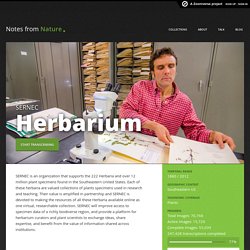
Today, there are an estimated two billion specimens housed in natural history museums around the world! These biological collections document where species and populations exist now and where they existed decades and centuries before, so they hold irreplaceable information necessary for uncovering the patterns of changes in species distributions and ecosystem composition over time. Scientists use such data and information in order to address key environmental issues we are facing right now, such as the impacts of climate change and how diseases affect wildlife and humans. For the information held in these collections to be used to its full potential there must be better digital access to these data. Notes from Nature. Natural History has its roots in the ancient world, from Aristotle’s History of Animals to Pliny the Elder’s Natural History.
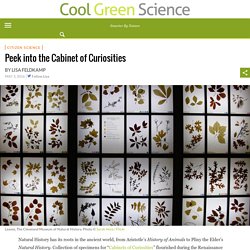
Collection of specimens for “Cabinets of Curiosities” flourished during the Renaissance (many of them contained fantastical faked creatures) and some of the earliest Natural History museums, like the Muséum National d’Histoire Naturelle, were founded. By the 19th century, modern scientific collection had begun and many of today’s Natural History collections originate from this period. At present, there are an estimated 2 billion (yes, really billion) specimens housed in Natural History museums around the world – a truly astonishing record of life on earth. However, much of that information was recorded by hand or typed, making it difficult to access and impossible to bring together into any kind of big data analysis. Each transcription takes about 3 minutes to complete, all work is done online, and it’s very easy to learn.
Get Involved. Notes from Nature. The Botanic Garden and Botanical Museum Berlin says “Danke schön” – “Thank you” Herbarium and the biodiversity informatics staff at the Botanischer Garten und Botanisches Museum Berlin Thanks a lot to the Notes from Nature Community for completing the Amaranthaceae expedition.
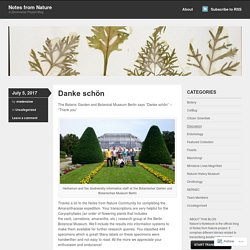
Your transcriptions are very helpful for the Caryophyllales (an order of flowering plants that includes the cacti, carnations, amaranths, etc.) research group at the Berlin Botanical Museum. We’ll include the results into information systems to make them available for further research queries. Smithsonian Digital Volunteers. Volunteers Needed for Massive Smithsonian Digitization Project. Today the Smithsonian launches its Transcription Center website to the public.
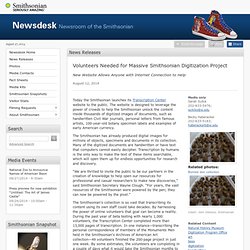
The website is designed to leverage the power of crowds to help the Smithsonian unlock the content inside thousands of digitized images of documents, such as handwritten Civil War journals, personal letters from famous artists, 100-year-old botany specimen labels and examples of early American currency. The Smithsonian has already produced digital images for millions of objects, specimens and documents in its collection. Many of the digitized documents are handwritten or have text that computers cannot easily decipher. Transcription by humans is the only way to make the text of these items searchable, which will open them up for endless opportunities for research and discovery. “We are thrilled to invite the public to be our partners in the creation of knowledge to help open our resources for professional and casual researchers to make new discoveries,” said Smithsonian Secretary Wayne Clough.
AnnoTate. Zooniverse - Real Science Online. Citizenscience.gov. NSF Citizen Science. DiscoveryBe a (citizen) scientist!
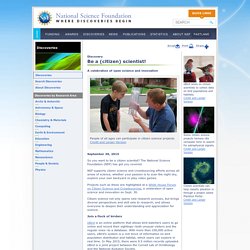
A celebration of open science and innovation September 30, 2015 So you want to be a citizen scientist? The National Science Foundation (NSF) has got you covered. NSF supports citizen science and crowdsourcing efforts across all areas of science, whether your passion is to scan the night sky, explore your own backyard or play video games. Projects such as these are highlighted at a White House Forum on Citizen Science and Crowdsourcing, a celebration of open science and innovation on Sept. 30. Citizen science not only opens new research avenues, but brings diverse perspectives and skill sets to research, and allows everyone to deepen their understanding and appreciation for science. Join a flock of birders eBird is an online platform that allows bird-watchers users to go online and record their sightings--both unusual visitors and the regular ones--to a database.
Count every drop Search for stars with your computer Be part of a supercomputer. iNaturalist.org · A Community for Naturalists. Kcopas's Year On iNat 2017 · iNaturalist.org. The "Herbonautes", the site to help researchers of the world's largest herbarium. PLANTES - L'Herbier national français est le plus important du monde.
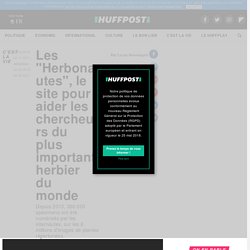
Hébergée par la galerie de Botanique au Jardin des Plantes, sa collection de plantes pressées du monde entier, qui appartiennent au Muséum national d'Histoire naturelle, n'est pas ouverte au public. En revanche, la collection numérique, faite de 6 millions de spécimens, est visible en ligne. Et ce n'est pas tout. Depuis 2013, le site des Herbonautes permet au grand public de collaborer avec les chercheurs de l'Herbier.